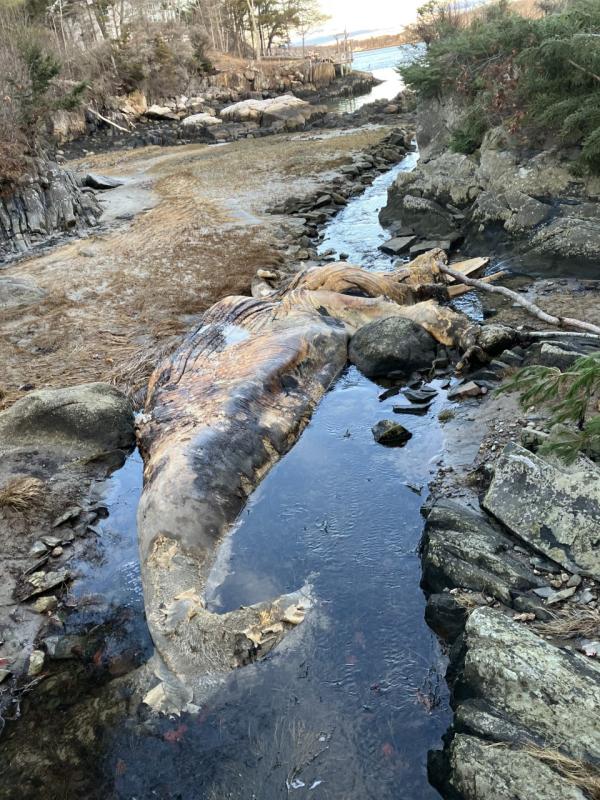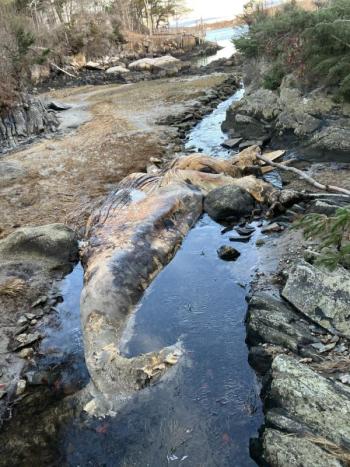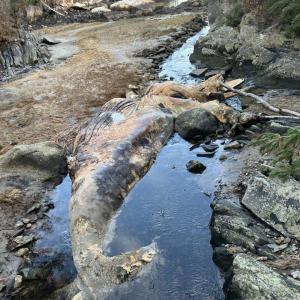A whale of a tale – revisited
The Dec. 23 superstorm brought us downed trees, power outages, lots of worries, and a whale.
Yes, a whale. The carcass of a 30-foot-long juvenile humpback whale washed ashore on Farnham Point. According to Kellee Joost, secretary, Farnham Point Association, on Dec. 23, the storm surge moved the massive carcass from Inner Heron Island, where it had rested for a while, depositing it in the little creek running beside the community shore picnic spot.
While the weighty whale (sorry, I couldn’t resist) became an attraction for the few Farnham point winter folk, it would soon begin to decompose with the attendant odors.
So, the association contacted Marine Mammals of Maine, the state-sanctioned agency authorized to dispose of the remains of protected species, ranging from seals to whales. On Thursday, Jan. 5, Harry Doughty & Son Excavating of Phippsburg shoehorned an excavator into the property, scooped up the remains of the whale, stuffed it in a dump truck, and sent it off to a composting farm in Gorham.
Freddie the Farnham Point whale is a good news story. The community association moved quickly to remove it at a minimum cost. But it was a double-good news story. First of all, as of Thursday, it is gone. The thought of a whale festering into the sand just down the hill from some high-end summer homes might have put a wet blanket on the summer folk's jolly holiday outings.
The cost? About $1,500, the association said. That price was less than that quoted to Ham Meserve when he asked Chuck Fuller what it would take to bury the 58-foot-long, eight-ton carcass of a humpback whale that washed up on his Cape Island in 2016.
The federal Environmental Protection Agency bureaucrats wanted him to bury the whale in a grave on the highest point of the island. That whale funeral project would cost somewhere around $30,000 to $50,000 and bring barges, trucks, winches and the rest of the burial gear to the island, he said.
Cape Island sits just off the edge of Southport. It is best known as the summer residence of Meserve’s mom, the late Hollywood actor Margaret Hamilton, best known for playing the Wicked Witch of the West in “The Wizard of Oz.”
Ham, a long-serving Lincoln County commissioner and retired international bank executive, said a strong storm washed his whale, known as Wally, to the mid-island. A second storm almost pushed it just short of rolling into the channel between Cape and Hunting islands. The third storm washed most of old dead Wally into the briny deep, except for some bones and a bit of blubber that remained on shore. What was left was a magnet for seagulls and other critters that feasted on the festering flesh, but Meserve was worried the smell would put a damper on the annual summer wedding season at the nearby Newagen Seaside Inn.
So, staffers from Marine Mammals of Maine covered the remains with lime to keep the smell down. No whale. No more problem.
However, the best news coming out from the Farnham Point whale adventure, especially for our seafaring friends who fish for lobster, was that there was no, I repeat, no lobster fishing line attached to the carcass. In case you have been hiding under a rock, our local lobster fishing community is under attack from a California conservation association which, without any proof, accuses them and their gear of killing northern right whales, an endangered species. They say one of the biggest causes of mortality for the right whales is when they get entangled in lobster-fishing gear.
That accusation, again without any proof, triggered a boycott of Maine lobsters at Whole Foods. Meanwhile, the federal government is trying to interfere with Maine's lobster fishing industry pointing to the same questionable reasoning. However, the recent major federal spending bill, thanks to Senators King and Collins and Representatives Pingree and Golden, included a provision requiring the feds to put their case on hold for six years.
Sometimes, kicking the can down the road is a good thing.
Be well, be warm.






























